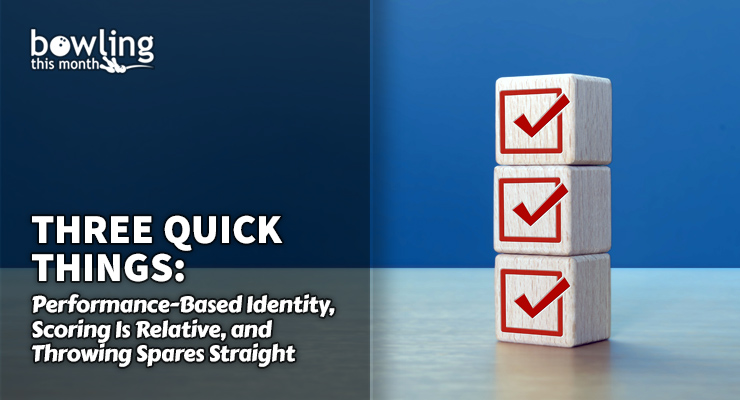Article Contents
- 1. What is a performance-based identity?
- 1.1. The good
- 1.2. The bad
- 1.3. Changing your outlook
- 2. Relative scoring pace
- 2.1. Evaluating scoring pace
- 2.2. Why does this matter?
- 2.3. It’s not about the number
- 3. Throwing spares straight
- 3.1. Method #1: a broken wrist
- 3.2. Method #2: forward roll
- 3.3. What about a spare ball?
Note: This article is only available to Bowling This Month subscribers.
In this recurring feature, I’ll be digging into three quick things to help you improve your game. In each installment, I’ll cover one aspect of the mental game, a lane play/tactical issue, and an element of the physical game.
Last time, we discussed becoming aware and changing self-limiting beliefs, some different variations of spare shooting practice, and improving your ball start. This month, we’ll start by talking about the benefits and pitfalls of what’s known as a performance-based identity. I’ll also dig into the concept of relative scoring pace and the implications on your strategy and mindset. And finally, we’ll discuss my recommended approach for throwing the ball straight at spares.
What is a performance-based identity?
Competitive athletes in any sport often have what’s known as a “performance-based identity.” This essentially means that “who we are” gets tied to “what we do.” The more competitive you are, the more likely it is that your performance will be tied to your sense of self-worth. Sometimes, this appears in less obvious ways.
Sure, it’s normal to be disappointed or frustrated or mad after a poor performance, but do the effects linger beyond a few minutes or hours? Does a bad tournament on Saturday carry over several days into the start of your work week? Is a bad night at league usually followed by a bad day at work? If this is a regular occurrence, then you’ve got some level of identity and value associated with your results on the lanes.
The good
Having a performance-based identity can be a positive, because it drives us to improve. Doing better on the lanes makes us feel good, so we are motivated to put the work in to improve our games. What starts as interest and joy in the sport evolves into a sense of self associated with it. As a competitive bowler, most of your social circle is probably also bowlers. At family gatherings (with family members who might also be bowlers), ...
Already a premium member? Click here to log in.


